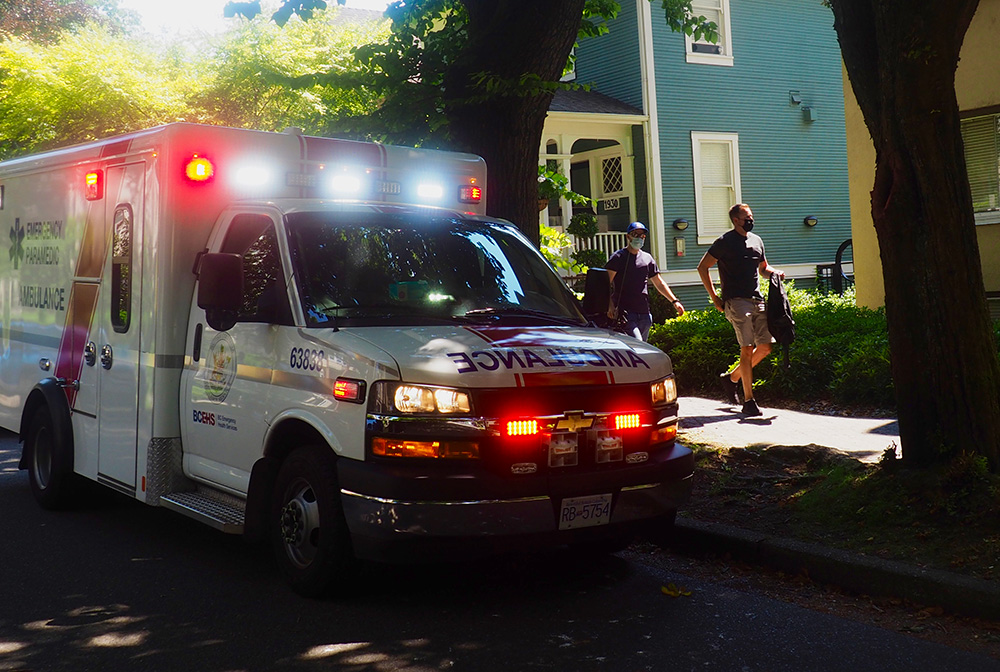British Columbia’s chief coroner is reporting 233 sudden deaths during the first four days of a record-breaking heat wave — nearly double the number normally reported in a four-day period, with the extreme heat suspected to be a factor in many of the fatalities.
Chief coroner Lisa Lapointe said her office would normally see 130 sudden deaths in a four-day period.
And Lapointe said the number of sudden deaths during the heat wave will certainly increase as the coroners service receives more information.
Asked whether his government had done enough to warn the public about the extreme health risks, Premier John Horgan said the situation was “unprecedented.”
“I’ll await the coroner’s determination — as Dr. Henry said, fatalities are a part of life — and the consequences of those fatalities are examined by officials that we put in place as a society to make sure we’re getting the best information possible,” Horgan told reporters at a press conference Tuesday, referring to Dr. Bonnie Henry, the province’s public health officer.
“The public was acutely aware we had a heat problem and we were trying to break through the noise to make sure they took steps to protect themselves.”
Asked whether the province should have stepped in to lead a co-ordinated emergency response, Horgan didn’t answer directly but said the heat wave shows that climate change is real and he hoped “hints” such as “keep the blinds closed, have that cold cloth in the fridge to cool yourself down” were getting through to people.
Horgan’s comments were quickly criticized on social media.
British Columbians are suffering under the #HeatDome and lives have been lost throughout the province.
— Andrew J. Reeve (@AndrewJReeve) June 29, 2021
People have died and John Horgan's response is to brush it off and say "fatalities are a part of life"
How incredibly disrespectful. #BCpoli #HeatWaveBC pic.twitter.com/zNHneC7kNh
And Horgan quickly apologized.
"Nothing can ease the pain of losing a loved one, whether it's from the unprecedented heat wave or any other cause,” he wrote on Twitter. “Mourning families deserve our compassion, and the wording of my comments didn't reflect that."
First responders have been overwhelmed by the number of sudden deaths that have happened over the past five days as a “heat dome” pressed down on western North America. Many of the deaths are related to the high temperatures, which have stayed above 30 C for most of the heat wave. Some towns in B.C. have seen temperatures soar above 40 C on multiple days.
In Vancouver, over 65 people died suddenly between Friday and Tuesday, police reported, with 20 of those deaths reported on Tuesday before 1:45 p.m. In Burnaby, police responded to 25 reports of sudden deaths in a 24-hour period between Monday and Tuesday: many of the people who died were elderly, and heat is likely a contributing factor in most of those deaths, according to Burnaby RCMP.
In Surrey, police responded to 20 sudden deaths on Monday and 18 on Tuesday.
Sgt. Steve Addison of the Vancouver Police Department said he knew of one officer who attended back-to-back sudden death calls. Police, paramedics and the coroner are all called to sudden death calls.
Police determine whether the death is suspicious; Addison said most of the sudden deaths seen over the past few days have been heat-related.
“It’s stretched our resources thin and we’re doing everything we can to keep up with the calls,” he said. Police are asking the public to only call 911 for emergencies.
Paramedics and 911 dispatchers have been overwhelmed by the number of calls, with some people waiting up to two hours for an ambulance. In one case, an elderly man died after he was driven to a fire hall, where firefighters could not revive him.
British Columbia rarely sees such extreme temperatures, and many homes, schools and office buildings don’t have air conditioning. Cities across the province encouraged people to come to buildings like libraries and community centres to cool off, and tried to get the message out to stay hydrated, seek shade and air-conditioned buildings and check on vulnerable people.
Horgan said that because of the COVID-19 pandemic, where more attention was paid to ventilation systems because of the risk of airborne transmission of the disease, there is long-term planning to retrofit schools for better heating, ventilation and air conditioning systems.
The provincial government is also planning to upgrade and build new long-term care facilities, where residents were especially susceptible to getting COVID-19 and dying from the illness.
First responders are begging people to check on vulnerable family members and neighbours to make sure they’re OK. Elderly people, young children and people with chronic illnesses are especially vulnerable to the heat. ![]()
Read more: Health, Environment
















Tyee Commenting Guidelines
Comments that violate guidelines risk being deleted, and violations may result in a temporary or permanent user ban. Maintain the spirit of good conversation to stay in the discussion.
*Please note The Tyee is not a forum for spreading misinformation about COVID-19, denying its existence or minimizing its risk to public health.
Do:
Do not: